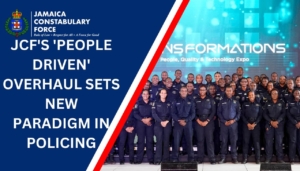
In the realm of law enforcement, a people-driven transformation is not merely a shift in strategy but a profound reorientation of values and priorities. When a police force recalibrates its compass to prioritize ‘people’ both as the catalyst and the recipients of change, it signals a transformative agenda where human capital is at the forefront.
But what does it truly mean to anchor transformation in the ‘people’ dimension? How do we position ‘people’ both as the architects and the beneficiaries of this metamorphosis?
In the latest dispatch from the Commissioner’s Corner, Police Commissioner Dr. Kevin Blake offers a compelling narrative that seeks to clarify the ‘people’ aspect of the Jamaica Constabulary Force’s mantra: “People, Quality, Technology.” As the JCF undergoes a sweeping overhaul, Commissioner Blake’s message homes in on the central pillar of ‘people’, and with discerning foresight, he makes a poignant observation: “The transformation by our people impacts our people.” The phrase resonates with profound implications — it is the men and women within the force who propel the transformation and are, in turn, its ultimate beneficiaries.
Commissioner Blake’s update to the members of the JCF is revelatory, detailing a strategic approach that leverages human potential as both the means and end. He writes, “We embarked on a four-year programme to get our numbers in-line with our establishment. This required significant refocus of the process of recruitment… we are at this point with the strength of our human capital.” Here, the Commissioner is drawing a clear line connecting the enhanced recruitment strategies directly to the fortification of the force’s ‘human capital’.
This focus on ‘people’ extends to nurturing the existing workforce through education and professional development. The Commissioner underscores this commitment, stating, “We will take a look at how the transformation by our people impacts our people… We continue with our Supervisory Leadership Training, we are pursuing a Level 5 or degree in Supervisory Management.” In this way, the JCF ensures that transformation is not a top-down imposition but a shared journey where every member’s growth is integral to the institution’s progress.
Moreover, by revamping the Command Course and partnering with academic institutions for specialized programs, the Commissioner articulates a vision where ‘people’ are not static resources but dynamic agents of change equipped with cutting-edge skills and knowledge.
Commissioner Blake’s vision for the JCF reflects a modern and empathetic approach to law enforcement reform, where ‘people’ are not mere cogs in the machinery of justice but the very essence and drivers of its efficacy. The significance of this vision becomes even more pronounced as the JCF celebrates 75 years of women in service — a milestone that embodies the ethos of ‘people’ as both the input and output of transformation.
In adopting such a people-focused approach, the Commissioner lays down a blueprint for how to put ‘people’ at the heart of organisational transformation, ensuring that the force’s evolution is reflective, inclusive, and fundamentally human. The JCF’s transformation narrative, therefore, becomes more than a story of structural reform. It is part of a broader Jamaican story of human empowerment and societal progress.







